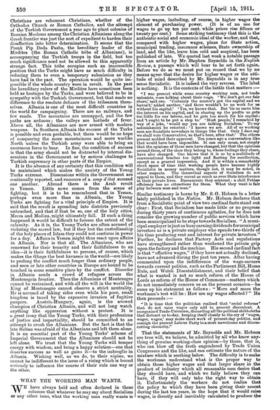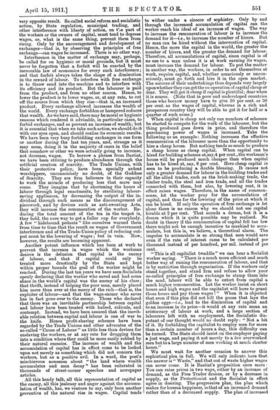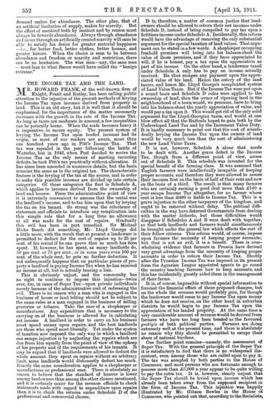WHAT THE WORKING MAN WANTS.
WE have always held and often declared in these columns that whatever he may say about Socialism or any other isms, what the working man really wants is higher wages, including, of course, in higher wages the element of purchasing power. (It is of no use for wages to go up ten per cent. while prices rise fifteen or twenty per cent.) Some striking testimony that this is the authentic social and economic ideal of the worker, and that, compared with higher wages, plans for State action, municipal trading, insurance schemes, State ownership of land, and the like, leave him cold and sceptical, has been published of late. We quoted last week a notable passage from an article by Mr. Stephen Reynolds in the English Review, a passage which will bear to be set forth again. Before we do so we must put on record that we by no means agree that the desire for higher wages or the atti- tude of mind described by Mr. Reynolds is in any true sense Socialistic. It is indeed the very reverse. The label is nothing. It is the contents of the bottle that matters :—
"I was present while some country working men, not trade unionists, were talking about their wage. We don't get our fair share,' said one. Certainly the master's got the capital and we haven't,' added another, and there wouldn't be no work for us without his capital.' `Yes, we knows that. But 'tis us earns him the interest on his capital, and in sharing up the profits us gets too little for our labour, and he gets too much for his capital: and 't ought to be put a stop to.' `Most people,' I remarked by way of a joke, would say you are talking Socialism.' To my astonishment he retorted : I knows we are. All of us working men are Socialists nowadays in things like that. Only I dare say we shall vote Conservative, us that's here, after that.' The others present nodded their approval. Ten years ago a conversation like. that would have been impossible. It can only mean, not simply that the opinions of those men have changed, but that the opinions around them, of the class they belong to, whose feelings they share, have also changed. One knows that it is so by a multitude of conversational touches too light and fleeting for recollection, except as a general impression. And it is within a remarkably short space of time that working people have become highly Socialistic in money matters, though not, it may be noted, in other respects. The theoretical aspects of Socialism do not appeal to them, and they resent as much as ever State interference in their private lives. Bureaucrats they mistrust : a chill Fabian efficiency has no attractions for them. What they want is fair play between man and man."
Similar testimony is borne by Mr. S. G. Hobson in a letter lately published in the Nation. Mr. Hobson declares that from a Socialistic point of view two cardinal facts stand out clear : First, that Socialism has made little or no progress during thirty years of continuous agitation, for he does not consider the growing number of public services which have been municipalised to be steps towards Socialism. "A muni- cipal employer is just as busy earning dividends formunicipal investors as is a private employer who spends two-thirds of his time producing rent and interest for private investors." Further, be declares that Factory Acts and regulations have strengthened rather than weakened the private grip upon the factory and the machine. His second cardinal fact is that " effective wages," if they have not actually declined, have not advanced during the past ten years. After having commented upon the indifference of the wage-earners towards current politics, such as the Parliament Bill, Home Rule, and Welsh Disestablishment, and their belief that what is wanted is not so much reform of the House of Lords as reform of the House of Commons—matters which do not immediately concern us on the present occasion—he sums up his statement as follows : " More and more the workman's test will be : How are my wages affected ? " He then proceeds :- " It is time that the politician realised that social reforms' that do not raise wages only add to present discontent. A reorganised Trade-Unionism, discarding all the political shibboleths that distract us to-day, keeping itself closely to the cry of wages, wages, wages,' may make short work of present-day politics, and consign the present Labour Party to a most unwelcome and discon- certing obscurity."
That the statements of Mr. Reynolds and Mr. Hobson are true will, we believe, be admitted by all who know any- thing of genuine working-class opinion—by those, that is, who can blow off the froth engendered by Trade Union Congresses and the like, and can estimate the nature of the mixture which is seething below. The difficulty is to make the workman understand what is the proper way to obtain those higher wages and that larger share in the product of industry which all reasonable men desire that they should have, and which we fully believe they can ' have, if they will only take the right way to obtain it. Unfortunately the workers do not realise that the policy to which they have been giving their assent during the last ten years, in the hope that it would raise wages, is directly and inevitably calculated to produce the very opposite result. So-called social reform and socialistic action, by State regulation, municipal trading, and other interference with liberty of action, on tl.e part of the workers or the owners of capital, must tend to depress wages, or, what is the same thing, prevent them from rising. Only by the encouragement and development of exchanges—that is, by observing the principles of free exchange—can wages be increased. There is no other way. Interference in the matter of exchange may, perhaps, be called for on hygienic or moral grounds, but it must never be forgotten that a forfeit will be exacted by the inexorable law of economics for every such interference ; and that forfeit always takes the shape of a diminution in the reward of labour. To interfere with free exchange is to throw sand into the machine and to interfere with its efficiency and its product. But the labourer is paid from the product, and from no other source. Hence, to lower the product is to lower wages, or, at any rate, to cut off the source from which they rise—that is, an increased product. Every exchange allowed increases the wealth of the world. Every exchange forbidden or hampered reduces that wealth. As we have said, there may be moral or hygienic reasons which rendered it advisable, in particular cases, to forbid exchanges, and so prevent an increase of wealth; but it is essential that when we take such action, we should do it with our eyes open, and should realise its economic results. We have been very busy forbidding exchanges in one form or another during the last ten years, and, strange as it may seem, doing it in the majority of cases in the belief that somehow or other we were actually going to increase, not decrease, wages. To borrow a phrase from Bastiat, we have been striving to produce abundance through the artificial creation of scarcity. The Trade Unions, with their protective policy, have been specially ardent worshippers, unconsciously no doubt, of the Goddess of Scarcity. They are firm believers in their capacity to work the miracle of producing less that more may come. They imagine that by shortening the hours of labour through legal enactments, by sterilising labour- saving appliances, by decreasing the output of the in- dividual through such means as the discouragement of piecework, and by devices such as anti-sweating Acts, they will increase the remuneration of the worker. Re- ducing the total amount of the tea in the teapot is, they hold, the sure way to get a fuller cup for everybody. A few " hidebound pedants " like ourselves warned them from time to time that the result on wages of Government interference and of the Trade-Union policy of reducing out- put must be the lowering of wages ; but in vain. Now, however, the results are becoming apparent.
Another potent influence which has been at work to prevent that increase in wages which the workman desires is the delusion that capital is the enemy of labour, and that if capital could only be treated more drastically by the State and kept within proper bounds the goal of the worker might be reached. During the last ten years we have seen Socialists openly declaring that the worker who saved and had some share in the world's capital was the enemy of his class ; that thrift, instead of helping the poor man, merely placed him more than ever at the mercy of the rich—that is, the exploiter of labour—and that the wage-earner who saves has in fact gone over to the enemy. Those who declared that there was an inevitable partnership between capital and labour have been treated with hatred, ridicule, and contempt. Instead, we have been assured that the inevit- able relation between capital and labour is one of war to the knife. Hence profit-sharing schemes have been regarded by the Trade Unions and other advocates of the so-called " Cause of Labour " as little less than devices for enslaving the workers, or at any rate for drugging them into a condition where they could be more easily robbed by their natural enemies. The increase of wealth and the accumulation of capital has in effect come to be looked upon not merely as something which did not concern the workers, but as a positive evil. In a word, the poet's mischievous nonsense about " the land where wealth accumulates and men decay " has been reiterated in thousands of street-corner speeches and newspaper articles.
All this heady talk, all this representation of capital as the enemy, all this jealousy and anger against the accumu- lation of wealth, has, we venture to say, only been another preventive of the natural rise in wages. Capital tends to wither under a sirocco of sophistry. Only by and through the increased accumulation of capital can the worker reach his ideal of an increase of wages. The way to increase the remuneration of labour is to increase the demand for it—i.e., to increase the number of hirers. But no man can be hired without the intervention of capital. Hence, the more the capital in the world, the greater the number of hirers, and the greater the demand for labour. Therefore, all accumulations of capital, since capital is of no use to a man unless it is at work earning its wages, must increase the demand for labour. To put the matter in another way, the workers, in order to set themselves at work, require capital, and, whether consciously or uncon- sciously, must go forth and hire it in the open market. The success of their undertakings thus depends very largely upon whether they can get the co-operation of capital cheap or dear. They will get it cheap if capital is plentiful; dear when it is scarce. (Note that in poor and undeveloped countries those who borrow money have to give 20 per cent. or 30 per cent. as the wages of capital, whereas in a rich and prosperous country they will be able to get it for half or a quarter of such sums.) When capital is cheap not only can numbers of schemes be started to compete for the work of the labourer, but the thing produced goes down in price, and therefore the purchasing power of wages is increased. Take the following as an example: Nothing increases the effective remuneration of the labourer more than the opportunity to hire a cheap house. But nothing tends so much to produce a cheap house as cheap capital. When capital can be hired for building schemes at,say,4 per cent., the workman's house will be produced much cheaper than when capital has to be hired at, say, 8 per cent. Here cheap capital is seen to be producing a double blessing. It causes not only a greater demand for labour in the building trades and all the allied trades, such as the brick-making trade, the timber trade, the steel and iron trade, and all the trades connected with them, but also, by lowering rent, it in effect raises wages. Therefore, in the name of common- sense, let the worker pray for the accumulation of capital, and thus for the lowering of the price at which it can be hired. If only the operation of free exchange is let alone there is no reason why we should not see capital hirable at 2 per cent. That sounds a dream, but it is a dream which it is quite possible may be realised. No doubt in theory if the remuneration of capital fell too low there might not be enough incentive to mankind to accu- mulate, but this is, we believe, a theoretical alarm. The impulse to accumulate is so strong that men would save even if the rate of interest came to be calculated per thousand instead of per hundred, per mil. instead of per cent.
" This is all capitalist twaddle " we can hear a Socialist worker saying. " There is a much more efficient and much better way of raising the remuneration of labour, and that is by restriction through organisation. If the workers only stand together, and stand firm and refuse to allow your so-called principles of free exchange to stamp them into the mud, labour will be able to extort from capital a much higher remuneration. Let the worker insist on short hours and high wages and the capitalist will have to grant those hours and pay those wages ! " When it is objected that even if this plan did not kill the goose that lays the golden eggs—i.e., lead to the diminution of capital and to an increase in its price—it would at any rate mean an aristocracy of labour at work, and a large section of labourers left with no employment, the Socialistic dis- putant of our thought would no doubt reply : " Not a bit of it. By forbidding the capitalist to employ men for more than a certain number of hours a day, this difficulty can be turned. The State should insist on the employer paying a just wage, and paying it not merely to a few overworked men but to a large number of men working at much shorter hours."
We must wait for another occasion to answer this sophistical plea in full. We will only indicate here that the answer is " Waste," and that out of waste higher wages can never come. It is Bastiat's proposition once more You can raise prices in two ways, either by an increase of demand, as the Free Trader desires, or by a decrease in supply, as the Protectionist and the Socialist in effect agree in desiring. The progressive plan, the plan which makes for human happiness, is that of an increased demand rather than of a decreased supply. The plan of increased demand makes for abundance. The other plan, that of an artificial limitation of supply-, makes for scarcity. But the effort of mankind both by instinct and by reason must always be towards abundance. Always through abundance and never through an artificially created scarcity will man be able to satisfy his desire for greater material happiness —i.e., for better food, better clothes, better houses, and greater leisure. When the choice is seen to be between abundance and freedom or scarcity and restriction, there can be no hesitation. The wise man—nay, the sane man —must lean to what Bacon would have called the "benign extreme."






































 Previous page
Previous page